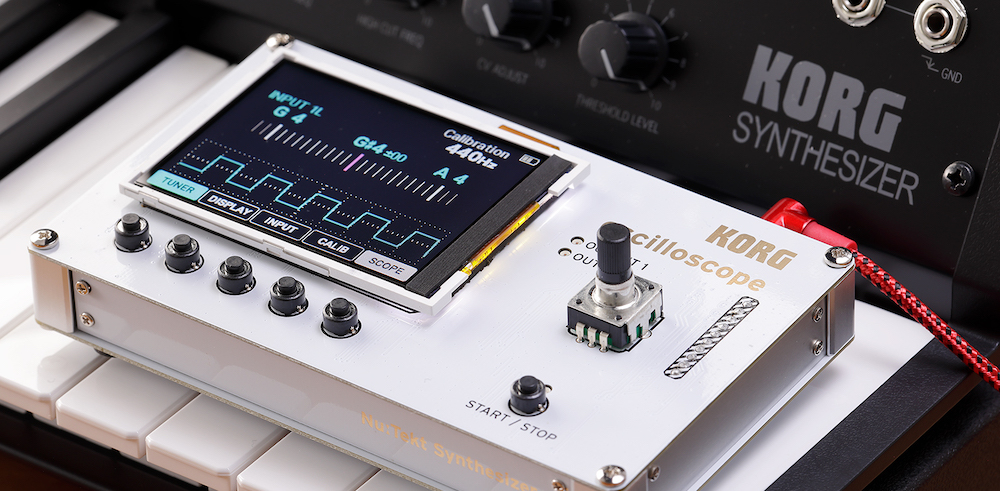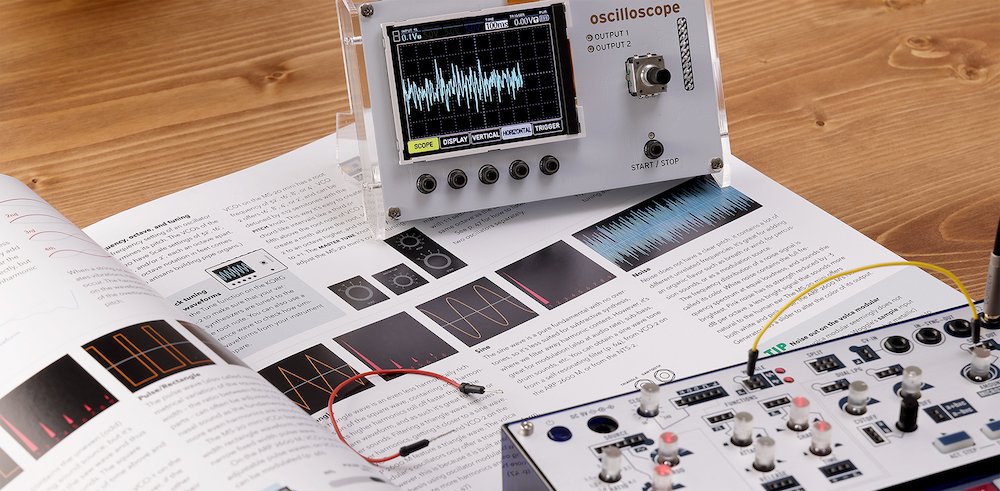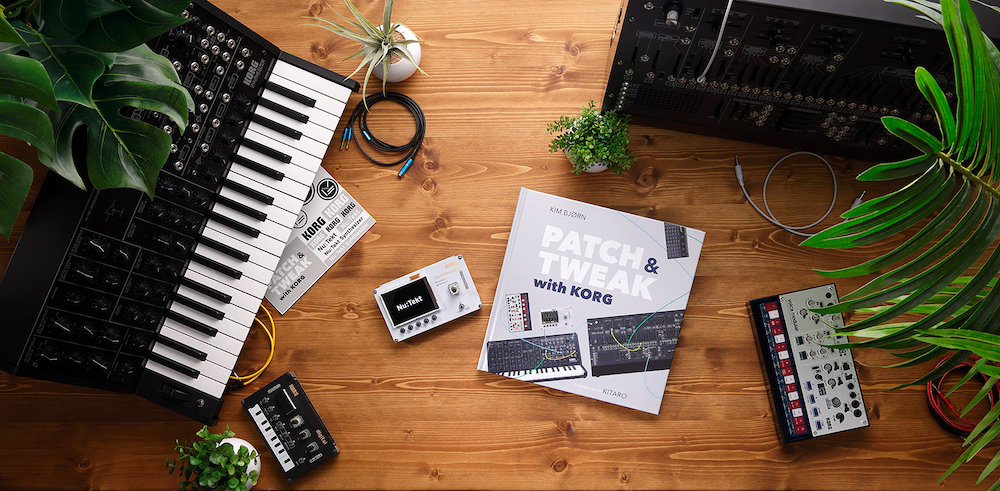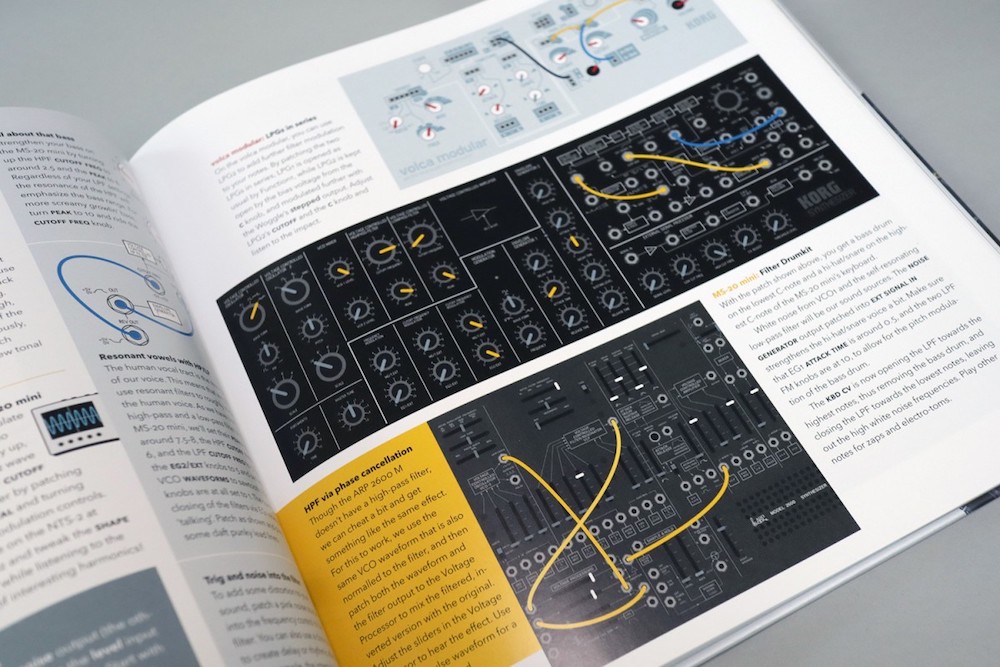Korg’s latest DIY kit is a bargain-priced scope bundled with an insightful book. Greg Scarth explains why you need to add this to your synth setup, whether you’re a Korg fan or not.

Nu:Tekt is Korg’s experimental offshoot, a sub-brand focussed around DIY kits, allowing users to customise, program and develop their own instruments and tools. Previous releases have included the NTS-1 digital synth, HA-S headphone amp and OD-S overdrive, devices which offered simple DIY assembly and the potential to experiment and develop from the basic platform. The Korg Nu:Tekt NTS-2 oscilloscope kit is the latest offering in the range, following the same basic formula. It’s a simple self-assembly device which is bundled in this case with a special Korg-focussed edition of Kim Bjørn’s Patch & Tweak series, previous editions of which have covered modular synthesis and Moog.
Why would you want an oscilloscope? It’s a fair question, and one which is answered well in Bjorn’s preface to the book: “The NTS-2 is meant to enhanced your reading and exploring by simply letting you see what’s going on – to understand synthesis with your eyes as well as your ears. Beyond its educational uses, it has many other functions that make it a great tool for any studio, especially when paired with any modular or semi-modular instrument. You’ll soon see why.” We’ll come back to the uses of the device in due course, but the first task is to assemble it. Constructing the NTS-2 is straightforward if a little bit fiddly at points. Most of the outer case of the unit arrives as a single circuit board which is snapped apart by hand to make the top, bottom and two side panels of the scope, screwed together with aluminium corners and side panels. The display, rotary encoder and buttons are already fitted to the top panel, while a separate circuit board is attached inside, housing the main circuitry and sockets. The only real challenge lies in the size of the tiny screws used to assemble the enclosure; a miniature screwdriver is included in the box but a proper Philips precision screwdriver makes the process a lot easier. Power comes via two AAA batteries or USB if preferred.

With the NTS-2 assembled, powering it on lights up an impressively clear and detailed display. There are three main analysis modes here: oscilloscope, spectrum analyser (FFT) and tuner. The latter is straightforward, allowing you to tune instruments or oscillators with an optional waveform view. The other two modes are much deeper, taking advantage of the NTS-2’s four inputs (two stereo 3.5mm sockets, which can be fed separate mono signals using a TRS to twin 3.5mm adapter). In scope mode, up to four CV or audio sources can be analysed simultaneously, and the simple benefit here is being able to visualise the electrical signals within your synths; as part of a semi-modular or modular synth setup, being able to see what happens when you change parameters proves to be hugely helpful in programming sounds and understanding what’s happening when you patch signals.
The Fast Fourier Transform (FFT) spectrum analyser mode will be more familiar than the oscilloscope for most users, similar to a spectrum analyser that you might find in an EQ plugin or the utility section of a DAW, visualising the frequency spectrum of a sound. Only one input can be monitored at a time here, with an oscilloscope view overlaid on the spectrum analysis. Once again, the main use here is to visualise how the harmonics and frequency response of a sound change when using, say, distortion. The analyser is also useful for pinpointing specific aspects of a sound; analyse a drum loop, for example, and you can identify the frequencies of the hits, allowing you to dial in filters or EQ to balance the sound. In both scope and FFT mode, the input signals are passively patched through to the Thru outputs, meaning you can easily use the NTS-2 in series as part of your signal flow without having to split signals.

As well as its scope function, the NTS-2 also works as a signal generator. Switch to the Wave display and you have two channels which can operate as oscillators or LFOs plus noise, pulse (clock) and envelope generators. These aren’t necessarily intended to be used as part of a modular synth setup – although they could be – but probably make most sense when paired with the scope to analyse signals. Generate a perfect sine wave, for instance, and you can then visualise how it gets affected when it’s run through a wave folder. Generate a perfect square wave and you can analyse how it’s affected by running through filters. The NTS-2 makes it easy to explore some of the fairly complex physics behind sound.

Patch & Tweak with Korg is a Korg-focussed take on Kim Bjørn’s popular series of synth books. This edition focusses heavily on Korg’s current range of semi-modular synths, including the MS-20 Mini, Volca Modular and ARP 2600M, as well as the SQ-1 and SQ-64 sequencers. The book isn’t just about the oscilloscope but does a good job of telling some of the history of Korg’s synths, exploring how artists and producers use them – including new-age icon Kitaro and YouTuber Andrew Huang – as well as making suggestions for how you can explore creative new approaches including analysing sounds with the NTS-2. It’s an excellent companion piece to the scope.

As oscilloscopes go, the NTS-2 is excellent value compared to the generic Chinese offerings which tend to flood the budget end of the market. Given that Patch & Tweak alone retails at over £40, the combined bundle price of £157 makes the NTS-2 a bargain. Aside from price, where it really shines is its user-friendliness, with clear menus and a simple approach which doesn’t feel intimidating even if you’re a complete newcomer to analysing electrical signals. Korg aficionado or not, the NTS-2 makes a fantastic addition to any synth setup.
Greg Scarth
More info/buy